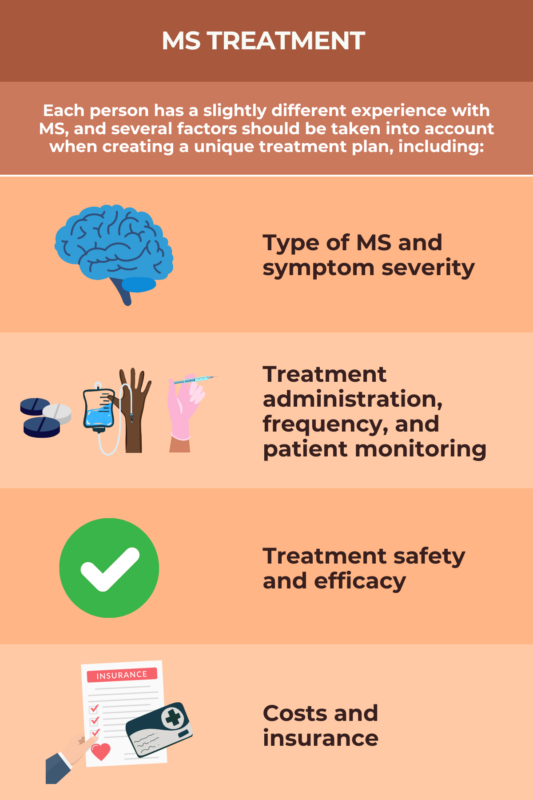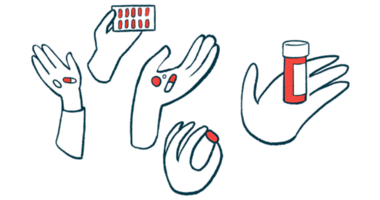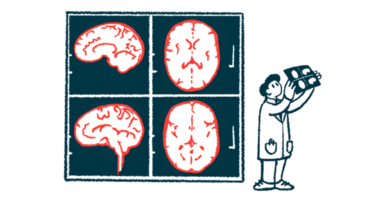MS treatment explainer for newly diagnosed patients
For people recently diagnosed with multiple sclerosis (MS), understanding the many MS treatment options available and the differences between them can be overwhelming. A variety of factors need to be considered when deciding which medication is the right one, and your healthcare team will work with you to determine an appropriate treatment approach.
The more information you have, including what therapies are available, how they are administered, and what exactly they do, the better prepared you will be to discuss treatment options with your doctor.
How many MS treatment options are there?
More than 20 therapies have been approved to treat MS in the U.S. While there are many differences in how they are administered and what they do within the body, all these therapies work to reduce inflammation and the autoimmune reaction associated with the disease. In doing so, they can reduce the risk of MS flares/relapses and/or disability progression.
Most of the multiple sclerosis treatments approved in the U.S. are specifically authorized to treat relapsing forms of the disease. These MS types are characterized by relapses or flares (where symptoms suddenly worsen), followed by periods called remissions (when MS symptoms ease or disappear entirely).
Far fewer therapies are available to treat progressive forms of MS, which are characterized by symptoms that gradually worsen over time independent of relapse activity.
In the U.S., Ocrevus (ocrelizumab) is the only approved therapy to treat primary progressive MS, and mitoxantrone is the only treatment approved for people with secondary progressive MS who don’t experience relapses. Consequently, the type of MS plays a major role in determining which treatment options are available for a given patient.
For some people with MS, stem cell therapy may be a treatment option, although this invasive procedure is usually only recommended for young people with early, aggressive relapsing types of MS that does not respond well to other treatments. Keep in mind that, to date, no stem cell therapy has been officially approved by the U.S. Food and Drug Administration (FDA) for the treatment of MS.
In addition to disease-modifying therapies for MS, a number of treatments are available to help manage disease symptoms and disease-related changes. The options range from symptom-specific medications such as antidepressants and treatments to relieve spasticity or pain, to alternative or complementary therapy approaches that can support a healthy lifestyle. Treatments are also available to ease relapses when they occur. While these types of treatments can help to relieve MS symptoms, they do not alter disease progression itself, so they should never be used in place of disease-modifying therapies.
What is a disease-modifying therapy?
A disease-modifying therapy, or DMT, is a medication that can alter the course of a disease. In MS, disease-modifying therapies are treatments that can lower the risk of relapses or disability progression.
In medical language, the term “disease-modifying therapy” is used instead of more general terms like “medicines” or “treatments,” in order to make a distinction between DMTs that can change the underlying course of a disease and symptomatic treatments that can offer relief for the symptoms of MS but don’t affect the progression of the disease.
Routes of administration
The various DMTs for MS can be divided into three broad categories based on how they are administered:
- Injection therapies are injected subcutaneously (under the skin) or intramuscularly (into the muscle), similar to how many vaccines or shots are given.
- Infusion therapies are given intravenously (into the vein), via a slow drip.
- Oral therapies are taken as a pill or tablet by mouth.
| Administration route | Therapy name | Details |
|---|---|---|
| Injection | Avonex (interferon beta-1a) | Injected intramuscularly once weekly |
| Betaseron (interferon beta-1b) | Injected subcutaneously every other day | |
| Extavia (interferon beta-1b) | Injected subcutaneously every other day | |
| Copaxone (glatiramer acetate) | Injected subcutaneously either once per day or three times per week | |
| Kesimpta (ofatumumab) | Injected subcutaneously once per month | |
| Plegridy (peginterferon beta-1a) | Injected subcutaneously once per month | |
| Rebif (interferon beta-1a) | Injected subcutaneously three times per week | |
| Oral | Aubagio (teriflunomide) | Taken once daily |
| Gilenya (fingolimod) | Taken once daily | |
| Mavenclad (cladribine) | Taken daily for four cycles, each lasting about two weeks, over the course of two years | |
| Mayzent (siponimod) | Taken once daily | |
| Ponvory (ponesimod) | Taken once daily | |
| Bafiertam (monomethyl fumarate) | Taken twice daily | |
| Tecfidera (dimethyl fumarate) | Taken twice daily | |
| Vumerity (diroximel fumarate) | Taken twice daily | |
| Zeposia (ozanimod) | Taken once daily | |
| Intravenous infusion | Briumvi (ublituximab) | Given in hourlong infusions every six months |
| Lemtrada (alemtuzumab) | Given in two rounds of | |
| Mitoxantrone | Given by infusion every three months | |
| Ocrevus (ocrelizumab) | Given by infusions lasting two hours or longer every six months | |
| Tysabri (natalizumab) | Given by hourlong infusions every four weeks |
Choosing an MS treatment
Deciding which MS treatment to use is a collaborative effort between the patient and their clinical care team. It is one of the most important steps after receiving an MS diagnosis. When making this decision, many factors need to be taken into account.
While only a few treatments are approved for non-relapsing, progressive types of MS, many more medications are available to treat relapsing MS types. For this reason, the type of MS a person has is an important consideration when deciding on treatment.
It is also important to consider how the treatment is taken, including the route of administration (injection, infusion, or oral) and how frequently the therapy must be given. Because treatments are generally most effective when taken according to approved dosing schedules, it’s crucial to find therapies the patient will be able to stick with.
Safety is another important factor to consider when deciding on a potential MS treatment. Like any medicine, disease-modifying treatments for MS can cause side effects — and some MS treatments pose a risk of side effects that can be serious or even life-threatening. Before starting on a treatment, it’s vital that patients talk to their care team about the potential side effects and what steps can be taken to lower the risk of serious problems due to treatment.
For several MS therapies, regular monitoring is recommended so that if side effects develop, they can be detected as early as possible and appropriate steps can be taken to prevent serious health issues. Before starting a new therapy, patients should understand what types of monitoring may be required (e.g., regular visits to a clinic for tests).
Efficacy is another key consideration when deciding among MS treatment options. While all the approved therapies have been proven to slow MS progression, some newer treatments are generally considered more effective at reducing disease progression — although these more effective therapies also tend to have a higher risk of serious side effects.
Sometimes, people with MS will initially start on a less effective but safer medicine. If that initial treatment is ineffective or difficult to tolerate, the patient may be switched to a more powerful drug with a riskier safety profile. This pattern of treatment is called an escalation strategy. Treatments that may be given first as part of this strategy include:
- fumarates such as Bafiertam, Tecfidera, and Vumerity
- glatiramer acetate, such as Copaxone and generics
- interferon therapies, such as Avonex, Betaseron, Extavia, Plegridy, and Rebif
- teriflunomide, such as Aubagio and generics.
Alternatively, some MS patients are started on a riskier high-efficacy therapy right away, which is called an induction strategy. High-efficacy treatments used first in this strategy include:
- anti-CD20 therapies such as Ocrevus, Briumvi, and Kesimpta
- S1P-targeting therapies like Gilenya, Mayzent, Zeposia, and Ponvory
- Lemtrada
- Mavenclad
- mitoxantrone
- Tysabri.
Patients should talk with their clinicians to understand the relative risks and benefits associated with each of these strategies and each of the specific medications available to decide what is best for their individual situation.
A final factor that should be considered when deciding on MS treatments is cost and insurance coverage. According to a 2022 review study, the lower cost per DMT user is around $57,000 per year, depending on sex and age. While there are generic versions of several therapies, these treatments still tend to be expensive. It’s crucial to make sure a patient will be able to continue to afford treatment and/or have insurance coverage for the therapy.

Home treatment vs. treatment center
Some MS treatments can be taken at home, while others require going to a treatment center for administration. Make sure to discuss the requirements for administration when deciding among treatment options.
All the available oral therapies for MS can be taken at home, although some may require monitoring during and/or after the first dose. All the available injection therapies also can be given at home by the patient or a caregiver, but only after having received training by a medical provider in how to properly perform the injection.
For infusion therapies, it is usually necessary to go to a treatment center to receive the infusion. In some cases, it may be possible to administer the infusion in a patient’s home, although this requires adequate equipment and a healthcare professional to go to the patient’s home.
How do I know if my treatment is working?
The available disease-modifying treatments for MS are designed to slow down the progression of the disease. This means that if a treatment is working, a patient will experience fewer MS flares and have less worsening disability over time.
Somewhat frustratingly, this means that the main way to tell whether or not a treatment is working is to wait and see whether or not the patient has new disease flares or worsening disability. If a patient continues to experience frequent attacks and worsening disability despite treatment, it’s a likely sign the therapy isn’t working properly.
In addition to looking for obvious signs of disease activity such as relapses and disability progression, clinicians also use MRI scans to track the progression of MS.
MRI can show where MS is causing damage to the brain and spinal cord — it can detect disease activity even if a patient hasn’t yet experienced any symptoms related to the new damage/lesions.
MRI scans are generally recommended every few months for MS patients. If scans show substantial new activity over time while on treatment, it may be another sign the treatment might not be working.
What are the options if my MS treatment isn’t working?
If a treatment is no longer adequately controlling a patient’s MS — or if the therapy is causing side effects the patient can’t tolerate — clinicians will generally recommend switching to a different treatment that’s either more effective and/or works differently. Together, patients and clinicians will try to find an effective treatment plan.
Participating in clinical trials
Clinical trials are studies involving human participants with the goal of testing the safety and effectiveness of treatments, including new experimental treatments. There are many different types of clinical trials with different designs based on what specifically the study is testing.
Before participating in a clinical trial, it is essential to understand exactly what participation will require. Because the goal of clinical trials is to collect a lot of data, participating in a trial usually involves more rigorous monitoring than what would be needed when being treated in a clinical practice.
Potential risks from participating in a trial, such as possible treatment side effects and the possibility of being given a placebo, should be discussed in detail before committing to a trial. Most trials also have specific requirements about who is allowed to participate, such as limitations by sex, age, and MS type.
The National MS Society hosts a database with information on MS clinical trials and other research initiatives in which people with the disease may be eligible to participate.
The NARCOMS registry collects data from people with MS who are interested in participating in clinical trials and other types of research. Participants in the registry are notified about trials for which they may be eligible.
The iConquerMS initiative allows patients to take surveys that researchers are using to learn more about MS and the priorities of the MS community. The initiative can also connect participants to relevant focus groups and clinical studies.
The MS Minority Research Engagement Partnership Network, which is aimed at increasing participation among non-white individuals who have historically been underrepresented in clinical trials, also offers resources to help MS patients get involved in trials.
In addition, the U.S. government maintains a database at clinicaltrials.gov with information on clinical trials in MS and other diseases in the U.S. and many other parts of the world.
Tips for treatment adherence
According to Jennifer Powell, an MS advocate who has secondary progressive MS, “the efficacy of any medication is reliant on the ability to take it as prescribed. After five years on a twice-annual infusion, I now take an oral disease-modifying therapy. Assuming it to be an easy transition, I quickly learned that there were things I had not anticipated.”
“Medication compliance is not punitive or suggestive of scolding. It is, however, one of the most important aspects of being on any medication,” says Powell, who also hosts the Multiple Sclerosis Podcast on Multiple Sclerosis News Today. “Learning to be our best medication advocate requires some guidance.”
She suggests these seven tips to help you follow your medication schedule based on her own experience:
- Your phone is smart. Set reminders to go off at specific times throughout the day. These reminders can be pivotal to maximizing medication adherence.
- If having an infusion, complete the required blood tests before arrival. They are for ensuring safety. Many centers order them within a two-week window. Follow all pre-infusion protocols so that medication is available on time and without delay. If you are nervous, don’t skip your appointment. Ask your doctor for guidance. Bring a favorite blanket, some good music, and a book. Ask a friend to accompany you. If necessary, your doctor can order a sedative.
- If you are on oral medications, check that the pharmacy has your medications in stock. If they need to order it, speak with the head pharmacist and ask how much lead time is needed to get it in stock. Set a reminder to call the pharmacy and remind them to order. Most automated systems will not override an early pickup. It is best to speak with a pharmacist.
- Use your healthcare app. Some pharmacies offer a customizable app that can remind you to take medications. If your provider does not have an app, check whether your phone provider’s app store offers it.
- Take any medication at the instructed time of day and follow specific guidelines. For example, some medications must stay refrigerated and can only be at room temperature when opened. Some specify what time of day they should be taken — like in the morning or night — and should be taken at the same time every day.
- Keep medications organized and ready to go. Stay organized. Pre-packing medications will make it easier to not skip taking them.
- If you are having trouble with compliance, ask yourself why and try to remedy the situation. Are you afraid of the side effects? Are you unable to afford the medication? Your doctor or insurance may be able to offer suggestions to help keep you on track.
Multiple Sclerosis News Today is strictly a news and information website about the disease. It does not provide medical advice, diagnosis, or treatment. This content is not intended to be a substitute for professional medical advice, diagnosis, or treatment. Always seek the advice of your physician or other qualified health provider with any questions you may have regarding a medical condition. Never disregard professional medical advice or delay in seeking it because of something you have read on this website.
FAQs about MS treatments
There are more than 20 therapies approved to treat multiple sclerosis (MS) in the U.S. Most of these are authorized to treat only relapsing types of the disease. A number of other non-disease-specific therapies are available to help manage disease symptoms, such as MS spasticity.
Yes, most approved multiple sclerosis (MS) treatments are specifically authorized to treat relapsing types of MS. There are far fewer therapies authorized to treat progressive forms of the disease.
Some treatments for multiple sclerosis (MS) can be administered at home, while others require going to a medical center. Most oral and injectable therapies can be given at home with proper training. Infusion therapies are more likely to require going to a center, although some infusion therapies can be given at home by a trained healthcare worker.
Some lifestyle factors may affect the efficacy of multiple sclerosis (MS) treatment — in particular, smoking cigarettes has been shown to lower the effectiveness of some MS therapies. Studies also suggest that smokers with MS tend to have worse symptoms and faster disease progression. Maintaining a healthy diet and getting regular exercise are considered an important part of living with MS; however, there is not much data to suggest these factors affect the effectiveness of treatment.
There are many different multiple sclerosis (MS) treatments. Each has a unique profile in terms of how it works, how it’s administered, and the possibility lf side effects. While some MS treatments are generally considered more effective than others, high-efficacy treatments generally carry a greater risk of side effects and other issues. It’s advised that people with MS work with their clinical care team to find the treatment that works best for them based on their unique situation.
Related Articles

 Fact-checked by
Fact-checked by 








